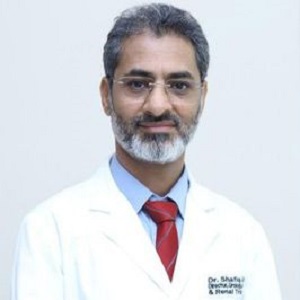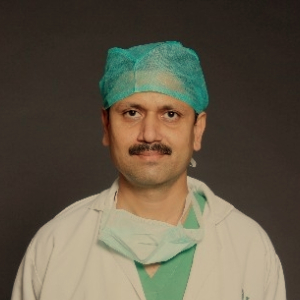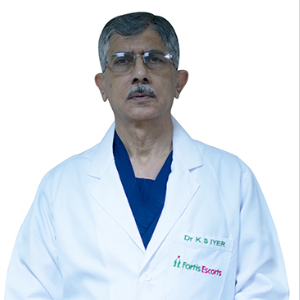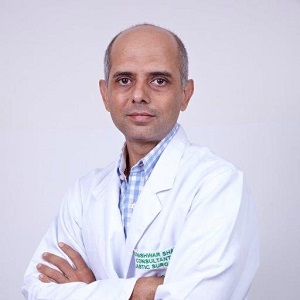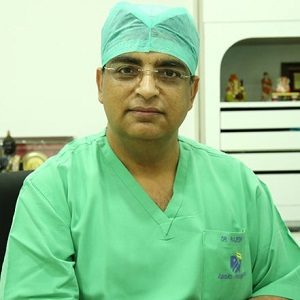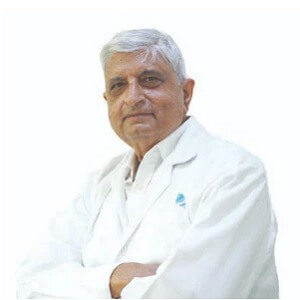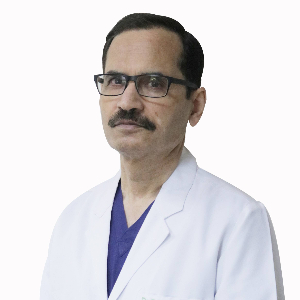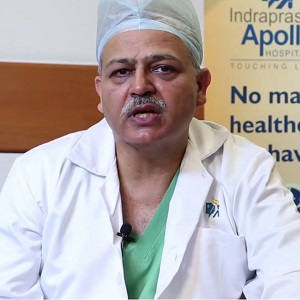Best Doctors in India for Alcoholic Hepatitis Treatment
- Director – Urology, Andrology & Renal Transplants
- 16+ years
Profile Highlights:
Profile Snapshot of Dr. Shafiq Ahmed
- With over 16 years of experience, Dr. Shafiq Ahmed is a highly skilled urologist and robotic surgeon.
- He has previously worked at some of the best hospitals in India and was instrumental in establishing Renal Transplant Programmes in some of the top hospitals within Delhi-NCR.
- Dr. Ahmed also holds US credentials as a robotic uro-oncologist.
- He has authored numerous book chapters and articles in medical journals on urological diseases.
- As one of the leading urologists, robotic surgeons, and renal transplant surgeons, Dr. Ahmed has trained many upcoming doctors in his field.
- He has also been a prominent speaker at various medical conferences.
- Surgical Oncologist, New Delhi, India
- Over 20 years’ experience
Profile Highlights:
- Dr. S M Shuaib Zaidi is a Senior Consultant of Surgical Oncology at Apollo Cancer Institute of Indraprastha Apollo Hospital.
- His expertise lies in the surgical treatment of cancer of the lungs, esophagus, breast, GI tract, and mediastinal regions.
- Dr. Shuaib Zaidi has close to 2 decades of experience in the field of Surgical Oncology and his expertise lies in Thoracic Oncology surgery.
- Dr. Shuaib is known to have developed an innovative technique known as Radical Neck dissection for head and neck cancer surgery that helps in preserving the marginal mandibular nerve in order to ease the cosmetic outcome of the procedure.
- Dr. Zaidi also has experience in Robotic Surgery and received training in the procedure from IRCAD in Strass Bourg, France.
- Pediatric Cardiac Surgeon, New Delhi, India
- Over 40 years’ experience
Profile Highlights:
- Dr. Krishna Subramony Iyer is one of the best Pediatric Cardiac surgeons in India and specializes in congenital heart diseases.
- He has been practicing pediatric cardiac surgery for over 4 decades and has performed more than 10,000 surgeries through various procedures like double switch operation TAPVC repairs, Fontan and Fontan, arterial switch, and DORV.
- Dr. Iyer has been associated with Escorts Heart Institute for a long time and is responsible for establishing the first pediatric cardiac care program in North India in 1995.
- Plastic & Cosmetic Surgeon, Gurugram, India
- Over 20 years’ experience
Profile Highlights:
- Dr. Adhishwar Sharma is a reputed plastic surgeon, with an extensive experience in plastic and reconstructive surgery.
- He has been associated with various hospitals like Fortis hospital Noida, Batra Hospital, Metro hospital Faridabad, and Central hospital Faridabad.
- He has an interest in Brachial Plexus reconstruction and lymphedema. He has published articles in various international and national journals. He is a member of various professional bodies.
- Endocrinologist, Diabetologist, New Delhi, India
- Over 26 years’ experience
Profile Highlights:
- Dr. Mohammada Asim Siddiqui is one of the best endocrinologists in India. He has an experience of over 26 years in the field. Dr. Siddiqui is active as a senior consultant – endocrinologist with Apollo Centre for Obesity, Diabetes, & Endocrinology, New Delhi.
- Dr. Siddiqui specializes in Internal Medicine & manages Diabetes, Endocrine and Metabolic Disorders, skin allergies, and Piles Treatment.
- His interest in Diabetes mainly focuses on young and gestational diabetes & Post-transplant & post-metabolic surgery diabetes.
- Dr. Siddiqui is also involved in various clinical research and has penned more than 50 articles in national and international journals.
- Robotic Urologist, New Delhi, India
- Over 27 years’ experience
Profile Highlights:
- Dr. Rajesh Taneja is one of the best Urologists in India, having experience of more than 27 years in the specialization. He is practicing at Apollo Hospitals, New Delhi as a senior consultant.
- Dr. Taneja specializes in surgeries to correct Congenital anomalies of urinary organs; Phimosis, PUJ Obstruction, Megaureter, Hydronephrosis, Vesicoureteric reflux (VUR), Hypospadias, Posterior Urethral Valves (PUV), Ectopia vesicae, and others.
- He is formally trained in the Robotic Surgical system and is one of the few urologists performing Robotic urological surgeries in India.
- Dr. Taneja has expertise in the Holmium Laser Enucleation of prostate technique.
- He has written numerous papers in national and international scientific publications.
- Dr. Rajesh Taneja also authored a book titled ‘Interstitial Cystitis’.
- ENT Surgeon, New Delhi, India
- Over 50 years experience
Profile Highlights:
- Dr. Sabir Husain Ansari is one of the best ENT/ Otorhinolaryngology surgeons in India practicing at Indraprastha Apollo Hospital. He holds nearly 50 years of experience in treating Sinus infections, sebaceous cysts, Epistaxis, Tonsillitis, and otoplasty.
- Dr. Ansari also helps with the hearing & speech evaluations in both children and adults. Being a specialized ENT doctor for nearly 36 years, he has competence in Micro Ear Surgery, Middle Ear Endoscopic, Neck Surgery, Nasal Surgery, Otoneurology, Pediatric ENT, Micro Laryngeal Surgery, Hearing Implant procedure, Endoscopic Sinus Surgery, and more.
- Cardiac Surgeon, New Delhi, India
- Over 30 years’ experience
Profile Highlights:
- Dr. Z S Meharwal is a well-known cardiac surgeon in India who has performed over 20,000 cardiac surgeries, including some of the most complex and high-risk cardiac procedures.
- Dr. Meharwal is a member of the founding team that started the Fortis Escorts Heart Institute and has been associated with the hospital since then.
- His interest lies in Minimally Invasive Cardiac procedures, valve repair, and replacement, and heart transplants among other major vascular and thoracic surgeries.
- Vascular Surgeon, New Delhi, India
- Over 35 years’ experience
Profile Highlights:
- Dr. Rakesh Mahajan is one of the best Vascular Surgeons in India. He has an experience of 35 years.
- He is a member of the Vascular Society of India and other eminent societies.
- Dr. Rakesh Mahajan is experienced in the diagnosis and treatment of vascular and related disorders.
- He qualified for the prestigious Intercollegiate Exam in the UK and was awarded a CCST certificate.
- ENT Surgeon, New Delhi, India
- Over 20 years’ experience
Profile Highlights:
- With over 20 years of experience obtained in several parts of the world, including the UK, USA, etc. Dr. Ameet Kishore is known for providing the best treatment for all conditions of ear, nose, and throat, in children as well as adults.
- Dr. Ameet Kishore is quite experienced in otology and has performed microscopic ear surgeries for ear infections and reconstruction surgery for hearing. Having received his training from the National Center for Cochlear Implantation, he has extensive experience in managing deafness with cochlear implantation.
- Dr. Kishore has also set up the Cochlear Implant Program with a series of over 500 Cochlear Implants procedures in eight years. He is also one of India’s first surgeons who have carried out Auditory Brainstem Implantation.
- With experience in functional endoscopic sinus surgery, using specialized tools such as endoscopic camera systems, microdebrider, and balloon sinuplasty, he has also performed advanced endoscopic procedures.
- Dr. Ameet Kishore is also competent in treating child problems such as tonsils, glued ears, adenoids, as well as noisy and difficult breathing, as well as any problem that can affect the pediatric airway.
Best Hospitals in India for Alcoholic Hepatitis Treatment
Indraprastha Apollo Hospital, New Delhi
- City: New Delhi, India
Hospital Highlights:
- Indraprastha Apollo Hospital is a 700-bedded multispecialty hospital in the heart of the capital of India. It is a part of Apollo Hospital group, one of India’s most reputed healthcare chains. Indraprastha Apollo Hospital has been accredited by Joint Commission International, making it the first internationally accredited hospital in the country in 2005.
- There are 52 specialties in the hospital with one of the best cardiology centers in the country. The hospital is also equipped with State of the art infrastructure facilities with the largest Sleep Lab in Asia and the largest number of ICU bed facilities in India.
- The hospital also has one of the largest dialysis units in India along with a dedicated Bone Marrow Transplant unit.
- The latest and highly advanced technologies that are installed in the hospital include Da Vinci Robotic Surgery System, PET-MR, PET-CT, Cobalt-based HDR Brachytherapy, Brain Lab Navigation System, Tilting MRI, Portable CT scanner, 3 Tesla MRI, 128 Slice CT scanner, DSA Lab, Endosonography, Hyperbaric Chamber and Fibro scan.
Fortis Memorial Research Institute, Gurugram
- City: Gurugram, India
Hospital Highlights:
- Fortis Memorial Research Institute is a multi-super-specialty, quaternary care hospital with 1000 beds. The hospital comprises reputed clinicians, and international faculty and is also equipped with cutting-edge technology. The hospital is a part of Fortis Healthcare Limited, a reputed chain of private hospitals in India.
- It is a NABH-accredited hospital that is spread across 11 acres of land and has a capacity of 1000 beds. The hospital has 55 specialties and is one of the premier health care centers in the Asia Pacific region popularly known as “the Mecca of Healthcare”.
- The hospital has 260 diagnostic centers and is also equipped with the latest and advanced techniques that include 3 Telsa which is the world’s first Digital MRI technology. The hospital also has world-class Radiation Therapy techniques which have been developed by leading technology experts from Elekta and Brain Lab.
Apollo Hospital, Chennai
- City: Chennai, India
Hospital Highlights:
- Apollo Hospitals, Chennai, is one of the best hospitals for heart care in India. Over the years, Apollo has expanded all over India, as a healthcare chain.
- India’s first ‘Only Pancreas’ transplant was performed in Apollo Hospital. The hospital is known for successfully performing Asia’s first en-bloc combined heart and liver transplant, and over the years, it has attained a remarkable achievement in the global healthcare space. Around 3-4 organ transplants are performed in the hospital per day.
- Equipped with over 500 beds, this hospital in Chennai was established in 1983 and since then has been among the most preferred hospital for patients from all over the world.
- The hospital holds accreditation of the NABH and JCI and is the first hospital in India to be ISO 9001 and ISO 14001 certified. It is also the first South Indian Hospital to receive subsequent reaccreditation from the JCI USA 4 times.
Medanta-The Medicity, Gurgaon
- City: Gurugram, India
Hospital Highlights:
- One of India’s best and largest multi-specialty hospitals, Medanta was built with the aim to bring India to the highest standards of medical care. The hospital has been providing the best medical services to its patients, since its inception, with care, commitment, and compassion.
- Equipped with 1250 beds, the hospital was founded by Dr. Naresh Trehan in the year 2009 with an aim to provide the best medical care at affordable costs. The hospital is spread across 43 acres and includes 45 operation theatres and 350 beds dedicated solely to ICU. The hospital includes over 800 doctors, and more than 22 specialty departments and has a dedicated floor for individual specialty in order to offer the best services under one roof.
- The hospital is considered one of the premier institutes in India for Cardiac Care and includes staffs and members of high caliber. The hospital has 6 distinct centers of excellence.
Max Super Specialty Hospital, New Delhi
- City: New Delhi, India
Hospital Highlights:
- One of the well-regarded providers in India committed to the highest standards of clinical excellence and patient care, Max Super Specialty Hospital is a part of Max Healthcare, which is the second-largest healthcare chain in India. Regarded as one of the most well-regarded healthcare providers in the country, Max Super Specialty Hospital is committed to the highest standards of clinical excellence as well as patient care. The hospital is also equipped with the latest technology as well as cutting-edge research. The hospital is known to deliver and ensure the highest level of patient care.
- The hospital has more than 500 beds and offers treatment for over 35 specialties. The hospital also holds the credit of having installed the first Brain Suite in Asia. This is a highly advanced Neurosurgical machine that allows MRI to be taken while surgery is ongoing.
- Other advanced and latest technologies are also installed in the hospital such as the 1.5 Tesla MRI machine, 64 Slice CT Angiography, 4D ECHO, LINAC, and 3.5T MRI machine.
Artemis Hospital, Gurugram
- City: Gurugram, India
Hospital Highlights:
- One of the most well-known hospitals in the Delhi NCR, Artemis Hospital is the first hospital in Gurugram to get accredited by the Joint Commission International.
- With more than 40 specialties, the hospital has been designed to be one of the most technically advanced hospitals in the country, with the best medical and surgical health care. The hospital has eleven special and dedicated centers, for Heart, Cancer, Neurosciences, etc.
- The latest technologies in the hospital include Endovascular Hybrid Operating Suite and Flat panel Cath Labs for the cardiovascular department, 3 Tesla MRI, 16 slice PET CT, 64 Slice Cardiac CT Scan, HDR Brachytherapy, and highly advanced Image Guided Radiation Therapy techniques (LINAC) are installed in the hospital.
- The hospital has won several awards as well, since its inception.
BLK Max Super Specialty Hospital, New Delhi
- City: New Delhi, India
Hospital Highlights:
- Equipped with 650 beds, BLK Superspecialty Hospital is the largest stand-alone private sector hospital in Delhi.
- With over 1500 healthcare providers and 150 globally renowned super specialists, the hospital is one of Asia’s largest Bone Marrow Transplant Centres. The hospital is known for having some of the best cancer doctors in the country.
- The hospital is NABH and NABL accredited and was inaugurated by the first Prime Minister of India. Pt. Jawahar Lal Nehru.
Gleneagles Global Hospitals, Chennai
- City: Chennai, India
Hospital Highlights:
- Established in 1999, Gleneagles Global Hospital, Chennai, is one of the top healthcare facilities in Southern India. It is part of the Gleneagles Hospital Chain, which is the fourth largest healthcare chain in the country. The hospital specializes in multi-organ transplants of kidneys, liver, lungs, heart, etc.
- The hospital has an excellent infrastructure and state-of-the-art lab and equipment set-up. The hospital boasts cutting-edge technologies, a highly skilled team of doctors and surgeons, and trained support staff. Located in Perumbakam, Chennai, it is one of India’s premier health care destinations. The hospital has performed some of the most complex surgical and clinical procedures in India including multi-organ transplantations.
- The hospital’s lung transplantation program is one of the best in the country. The hospital is known for having performed India’s first single lung transplant and first minimal invasive lung transplant. It is also the only Indian hospital to be associated with King’s College Hospital, London, United Kingdom for liver transplantations.
Fortis Hospital, Mulund, Mumbai
- City: Mumbai, India
Hospital Highlights:
- Fortis Hospital in Mulund is a 315-bed multi-speciality tertiary care hospital with five JCI accreditations that offers a wide variety of diagnostic and therapeutic services. The Fortis Hospital in Mulund delivers patient-centred treatment with cutting-edge technology, highly skilled and experienced surgeons, and paramedical staff.
- This institution houses Maharashtra’s largest multi-organ transplant centre. It is also the first heart transplant centre in western India to conduct 100 or more consecutive heart transplants in under four years. It is the only hospital in the city to have multi-organ transplants and has handled the youngest patient for angioplasty. Fortis Hospital Mulund now boasts the first advanced surgical robot in central Mumbai.
- Cardiology and heart surgery, urology, nephrology, neurosciences, orthopaedics, digestive care, emergency and critical care, and maternity care are among the services provided by the hospital.
Kokilaben Dhirubhai Ambani Hospital, Mumbai
- City: Mumbai, India
Hospital Highlights:
- Kokilaben Dhirubhai Ambani Hospital, Named after the wife of Indian industrialist Dhirubhai Ambani, the founder of Reliance Industries, this is one of the top hospitals in Mumbai. This 750-bed multi-specialty hospital became operational in 2009. Known as one of India’s most advanced tertiary care facilities, the hospital is designed to raise India’s global standing as a healthcare hub, with an emphasis on excellence in clinical services.
- Kokilaben Dhirubhai Ambani Hospital uses Protocol and Care Pathway based treatment models to ensure the best outcomes for patients.
- The hospital represents a confluence of top-notch talent, cutting-edge technology, state-of-the-art infrastructure, and, most importantly commitment.
- The hospital also holds the accreditation of the NABH, NABL, CAP, and JCI.
- The hospital has been recognized as the No. 1 Multispecialty Hospital in Mumbai and the West Zone for the fifth year in a row in 2020 by The Week.
ALCOHOLIC HEPATITIS
Alcoholic hepatitis is a liver infection, which is mainly caused by frequent, heavy use of alcohol. Fat can build up in the liver cells, which might lead to inflammation as well as scarring of the liver.
Alcoholic hepatitis might be mild or severe. A patient might even need a liver transplant if proper treatment is not provided, or if they don’t stop consumption of alcohol.
It is also notable that all heavy drinkers don’t develop this condition, and sometimes this condition even develops in people who drink moderately. However, if you are diagnosed with this condition, it is important for you to quit drinking alcohol. People who continue drinking alcohol might face a huge risk of serious liver damage as well as death.
Symptoms
Depending on the amount of damage to the liver, the symptoms can vary. If you are having a mild form of the disease, you might not even experience any symptoms at all. However, as the damage continues to grow, you might experience the following:
- Changes in appetite
- Dry mouth
- Weight loss
- Pain or swelling in the abdomen
- Jaundice, or yellowing of the skin or eyes
- Fever
- Nausea and vomiting
- Easy bleeding or bruising
- Changes in your mental state, including confusion
- Fatigue
The symptoms of this condition are similar to those caused by a few other health conditions. Therefore, if you develop any of these symptoms, it is best to get a proper diagnosis as well as begin treatment.
Causes & risk factors
Alcoholic hepatitis generally develops when the alcohol you drink causes damage to your liver. However, it is not clear why alcohol does this damages only to some heavy drinkers.
Few factors that are known to play a role in this condition include:
- The body’s process that breaks down alcohol produces some toxic chemicals
- These chemicals can trigger inflammation that can destroy the liver cells
- Thus, over time, scars replace healthy liver tissue, thus interfering with the function of the liver
- This irreversible scarring, which is also termed cirrhosis, is the final stage of alcoholic liver disease
If you have hepatitis C and continue to drink, even moderately, you are more likely to develop cirrhosis.
Some heavy drinkers are also malnourished because they don’t eat a proper balanced diet. Alcohol and its byproducts also prevent the body from absorbing nutrition properly. Lack of nutrition can contribute to liver cell damage.
Some other risk factors that can lead to this condition include:
- Your sex- Women are usually at a higher risk of developing alcoholic hepatitis since the way alcohol is processed in women is different.
- Binge drinking- Having over five drinks within two hours for men and four or more for women can increase the risk of alcoholic hepatitis.
- Obesity- Heavy drinkers who are overweight are also more likely to develop alcoholic hepatitis and to progress from that condition to cirrhosis.
- Race and ethnicity- Hispanic and Negroid people might be at higher risk of alcoholic hepatitis.
- Genetic factors- According to studies, there may be a genetic component in alcohol-induced liver disease. However, it is difficult to separate genetic and environmental factors.
Diagnosis
If you are showing symptoms of alcoholic hepatitis, your doctor will first inquire about your medical history and alcohol consumption. Next, he/she will perform a physical exam to see if you have an enlarged liver or spleen. They might also need a few more tests to confirm your diagnosis, such as:
- Complete blood count (CBC)
- Liver function test
- Ultrasound of the liver
- Abdominal CT scan
- Blood clotting tests
In some cases, a liver biopsy might also be needed to confirm the diagnosis of alcoholic hepatitis. A liver biopsy requires your doctor to remove a tissue sample from your liver, which is then tested in the lab. This method helps to show the severity and type of liver disease.
Treatment
Stopping alcohol consumption is the most important treatment for alcoholic hepatitis. There is no cure for this condition, but treatment can help in reducing or eliminating symptoms, or stopping its progression.
It is also important to note that scarring of the liver is permanent, but treatment can aim to restore as much function as possible.
Dietary changes
Medication
Liver transplant
The best hope of recovery is to be aware of the signs and symptoms as well as to reduce, manage, or if possible, completely stop consumption of alcohol.
Complications
Alcoholic hepatitis might lead to severe other complications such as:
- Enlarged veins (varices)- In this condition, blood that is unable to flow freely through the portal vein, can back up into other blood vessels in your esophagus or stomach.
- Hepatic encephalopathy- This condition can be caused by the buildup of toxins if your damaged liver is unable to remove all the toxins from your body. It involves confusion, drowsiness, and slurred speech.
- Ascites- Ascites is a condition in which the fluid that accumulates in the abdomen may get infected and thus, require treatment with antibiotics. Although this condition is not life-threatening, it can be a sign of advanced alcoholic hepatitis, or cirrhosis.
- Kidney failure- A damaged liver affects blood flow to the kidneys, thus resulting in kidney failure.
- Cirrhosis- The scarring of the liver might lead to liver failure.
Prevention
Alcoholic hepatitis might be prevented if you take the following steps:
- Drink alcohol in moderation, if at all- For healthy adults, moderate drinking means no more than one drink a day for women of all ages and men older than 65, and not over two drinks a day for men aged 65 and younger. However, if you prevent all alcohol, it is a certain way to prevent this condition.
- Check before mixing medications and alcohol- Ask your doctor if it’s safe to drink alcohol while you are taking medications. Consider reading the warning labels on over-the-counter medications as well. Don’t drink alcohol when you are taking medications that warn of complications when combined with alcohol.
- Protect yourself from hepatitis C- Hepatitis C is an infectious liver disease that is caused by a virus. If it is left untreated, it may lead to cirrhosis. If you are having hepatitis C and you consume alcohol, you’re generally more likely to develop cirrhosis than if you don’t drink.

